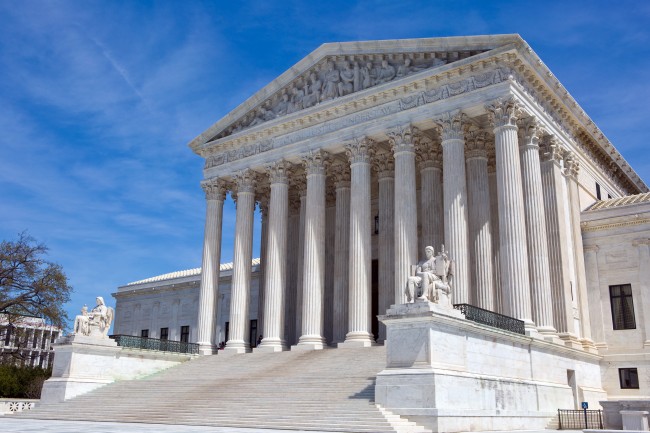Show posts for: Sarbanes-Oxley Act
-
 Read more
Read moreTell the Securities and Exchange Commission (SEC). That’s the message the United States Supreme Court sent to whistleblowers with its decision yesterday in Digital Realty Trust, Inc. v. Somers.
As we previously covered here, the Digital Realty case involved a key issue under the Dodd-Frank Act’s anti-retaliation provision: does the provision apply to a whistleblower who reported internally, but did not provide information to the SEC?
-
Read more
When Congress passed the Dodd-Frank Act in 2010, it bolstered protections for whistleblowers who report certain kinds of misconduct, such as violations of securities law. At the time, the Sarbanes-Oxley Act already provided many of these whistleblowers with a cause of action for retaliation. But the new Dodd-Frank cause of action included a longer statute of limitations, a more generous damages remedy, and a right to proceed straight to federal court rather than first bringing the claim to the Department of Labor (as Sarbanes-Oxley requires).
Sarbanes-Oxley provides protection for individuals who blow the whistle internally. But courts have struggled with whether Dodd-Frank provides that same protection, or if Dodd-Frank protects only individuals who report misconduct to the Securities and Exchange Commission (SEC) directly.
-
 Read more
Read moreWhen Congress passed the Sarbanes-Oxley and Dodd-Frank Acts, it included protections for employees who blow the whistle on wrongdoing by their employers. However, those whistleblower protections don’t apply to every report of wrongdoing. Rather, they come into play only when an employee reports particular types of misconduct.
For example, in a recent decision (Erhart v. BofI Holding, Inc.), a federal court in California dismissed claims by an internal auditor (Erhart) against his employer (BofI Holding), ruling that Erhart didn’t plausibly allege that he had been engaged in the "protected activity" necessary to qualify for the whistleblower protections of those statutes.
-
 Read more
Read moreIn our last post, we discussed the case of Wiest v. Tyco, in which the Third Circuit held that an employer’s investigation of unrelated wrongdoing by an employee insulated it against the employee’s Sarbanes-Oxley whistleblower retaliation claim. Now, we tackle another piece of the Wiest decision: the court’s holding that Wiest’s protected activity did not contribute to the adverse action against him.
To establish a Sarbanes-Oxley claim, an employee must show that there was a causal connection between his or her whistleblowing and an adverse employment action. If the employee can’t show that link, then he or she can’t prevail. In the Wiest case, the court assumed that Wiest did in fact engage in protected whistleblowing activity. But it held that Wiest didn’t have evidence to show that the whistleblowing caused the employer to take action against him.
-
 Read more
Read moreAn employee who has blown the whistle on wrongdoing is not immune from discipline or termination simply because she has engaged in protected activity.
The Third Circuit’s recent decision in Wiest v. Tyco Electronics provides a good example of how an employer can terminate an employee without legal repercussions, even when it is undisputed that the employee was protected against whistleblower retaliation.
-
 Read more
Read moreSection 1514A of the Sarbanes-Oxley Act shields a whistleblower from retaliation if he reports “conduct [that he] reasonably believes” violates certain laws, including Securities and Exchange Commission regulations. Last month, the Sixth Circuit held that the question of a whistleblower’s “reasonable belief” is a “simple factual question requiring no subset of findings that the employee had a justifiable belief as to each of the legally-defined elements of the suspected fraud.” Rhinehimer v. U.S. Bancorp Investments, Inc., No. 13-6641 (6th Cir. May 28, 2015). Based on this principle, the court affirmed a $250,000 verdict in favor of the plaintiff, Michael Rhinehimer.
According to the Court’s opinion, Rhinehimer was a financial planner for U.S. Bancorp who helped his elderly customer, Norbert Purcell, set up a trust and a brokerage account. In November 2009, Rhinehimer went on disability leave, and asked a colleague not to conduct any transactions with Purcell. The colleague didn’t follow the instructions, and instead put Purcell into investments that Rhinehimer believed were unsuitable. (Unsuitability fraud under the securities laws occurs when a broker knows or reasonably believes certain securities to be unsuitable to a client’s needs, but recommends them anyway.) Rhinehimer complained about the trades, but his superiors warned him that he should “stay out of the matter” and stop criticizing the colleague. After Rhinehimer hired a lawyer, he was placed on a performance improvement plan and fired after he failed to meet it.
-
 Read more
Read moreSection 304 of the Sarbanes-Oxley Act of 2002 requires the CEO and CFO of an issuer that has restated its financial statements to reimburse the company for any incentive or equity-based compensation, and for the profits on any stock sales of the company’s stock, during the 12-month period following the first issuance of the offending financial statements. Although this provision has been used sparingly by the SEC, the recent settlement of SEC investigatory charges by Saba Software, in which executives who were not charged with any wrongdoing agreed to repay bonuses and stock profits, is a cautionary tale for CEOs and CFOs of publicly traded companies.
Saba Software became the subject of an SEC investigation and enforcement action arising out of an alleged scheme to overstate revenues by overbooking and pre-booking time statements of international consultants in order to meet pre-arranged time estimates. As part of the settlement of the SEC charges in the fall of 2014, Saba was required to restate its financial records for the years 2009 through part of 2012. In a contemporaneous settlement, Saba’s CEO agreed to reimburse the company for over $2.5 million in incentive and equity compensation and profits from stock sales earned following the issuance of the financial statements the company restated. http://www.sec.gov/News/PressRelease/Detail/PressRelease/1370543035992#.VOtSdC6LXfc.
-
 Read more
Read moreThe Sarbanes-Oxley Act’s whistleblower protection provision, 18 U.S.C. § 1514A, allows a wrongfully terminated whistleblower to recover “all relief necessary to make [her] whole.” 18 U.S.C. § 1514A(c)(1). The statute then goes on to say that compensatory damages include reinstatement, back pay, and “special damages,” including expert fees and reasonable attorneys fees. In an opinion issued this week, the Fourth Circuit held that Sarbanes-Oxley damages don’t just include these enumerated damages. Rather, an employee can obtain other compensation for harm, including emotional distress damages. Jones v. SouthPeak Interactive Corp. of Delaware, Nos. 13-2399, 14-1765 (4th Cir. Jan. 26, 2015).
The plaintiff in the case, Andrea Gail Jones, was the former chief financial officer of SouthPeak, a video game manufacturer. According to the opinion, in 2009, SouthPeak wanted to buy copies of a video game for distribution, but didn’t have the cash to buy the games up front. Instead, SouthPeak’s chairman, Terry Phillips, personally fronted Nintendo over $300,000. When SouthPeak didn’t record this debt, Jones raised a stink, eventually telling the company’s outside counsel that the company was committing fraud. The same day, the company’s board fired her.
-
 Read more
Read moreWho doesn’t love the year-end countdown? We’re here to offer you one of our own – our most-read posts in 2014 about executive disputes. The posts run the gamut from A (Alex Rodriguez) to Z, or at least to W (Walgreen). They cover subjects from sanctified (Buddhists and the Bible) to sultry (pornographic materials found in an executive’s email). Later this week, we’ll bring you a look at what to expect in 2015.
Without further ado, let the countdown begin!
8. The Basics: Dodd-Frank v. Sarbanes-Oxley
This post is an oldie but a goodie. It includes a handy PDF chart that breaks down the differences in the Dodd-Frank and Sarbanes-Oxley whistleblower laws. Each of these laws continues to be a hot-button issue for plaintiffs and employers.
7. When Employment Relationships Break Bad
America may have bidden adieu to Walter White and his pals on Breaking Bad, but employment relationships continue to spin off in some very unpleasant ways. Such was the case with Stephen Marty Ward, who ended up in federal prison after he threatened his employer with disclosure of its trade secrets, as we covered in this post.
-
Read more
In yesterday's post, we covered the background of Tuesday's Supreme Court decision in Lawson v. FMR, LLC, and took an in-depth look at Justice Ginsburg's majority opinion. Today, we look at what the other Justices had to say.
Justice Scalia, joined by Justice Thomas, signed on to Justice Ginsburg's opinion in principal part, but also authored his own opinion. Justice Scalia and Justice Thomas subscribe to the position that a judge, in reading and interpreting a statute, should not examine what Congress said in places other than the statutory language, such as in committee reports and floor speeches. Based on that judicial philosophy, Justice Scalia criticized Justice Ginsburg for her “occasional excursions beyond the interpretative terra firma of text and context, into the swamps of legislative history.”
As the regulatory and business environments in which our clients operate grow increasingly complex, we identify and offer perspectives on significant legal developments affecting businesses, organizations, and individuals. Each post aims to address timely issues and trends by evaluating impactful decisions, sharing observations of key enforcement changes, or distilling best practices drawn from experience. InsightZS also features personal interest pieces about the impact of our legal work in our communities and about associate life at Zuckerman Spaeder.
Information provided on InsightZS should not be considered legal advice and expressed views are those of the authors alone. Readers should seek specific legal guidance before acting in any particular circumstance.
Contributing Editors

John J. Connolly
Partner
Email | +1 410.949.1149

Andrew N. Goldfarb
Partner
Email | +1 202.778.1822

Sara Alpert Lawson
Partner
Email | +1 410.949.1181

Nicholas M. DiCarlo
Associate
Email | +1 202.778.1835




